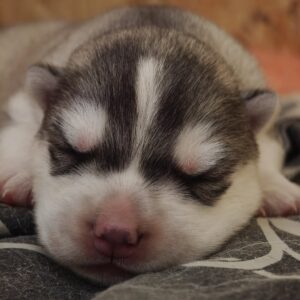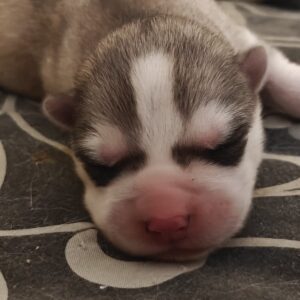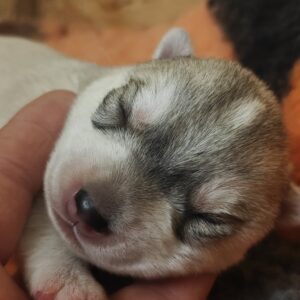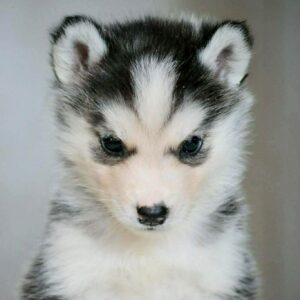
Siberian Husky
The Siberian husky is a handsome looking, practical sled dog that is the result of generations of dogs working the cold Siberian region. Although the Siberian Husky might seem to a docile, playful, and nonchalant, this breed might be a challenge to control for inexperienced dog owners. If bored Huskies may start to howl or become destructive. Siberian Huskies are very active indoors and it is not recommended to keep this breed of dog in apartments.
Due to their dense double coats, it is not recommended that this breed be kept in warm climates.
Siberian Husky breed attributes
About Siberian Husky breed
Description
The Siberian husky is a handsome looking, practical sled dog that is the result of generations of dogs working the cold Siberian region. The Husky’s head is made up of a fairly rounded skull and a straight tapering muzzle that meet each other at a defined, softly inclining stop. The Husky’s lips conceal a perfect scissor bite, and its slightly oblique, almond shaped eyes convey this breed’s notoriously mischievous energy and superior intelligence. The Husky’s triangular, blunt tipped ears sit erect and close to each other on the dog’s skull.
The dog’s head is carried proudly by this breed’s arched, strong neck. This breed has a strong back, tight loins and an angled croup – all intended to give the dog incredible forward propulsion in order to perform well as a sled dog. Its deep, narrow chest should give the dog the necessary lung volume for long distance sledding while not interfering with the dog’s graceful gait. Its straight, parallel legs are moderately spaced from each other and are characterised by strong shoulders and muscular thighs. The Husky’s bushy, sickle-shaped tail is carried over the back when the dog is excited.
Origin: Russia
Look
The Siberian Husky’s lush double coat is soft and welcoming, but should never disguise or oppose the Husky’s athletic form.
All colours are permissible. Copper huskies and pure white huskies often have liver noses and flesh coloured noses respectively.
Only grooming huskies’ inter-digital hair and whiskers is permissible, as anything else could harm the wellbeing of the animal. Huskies are seasonal shedders and shed heavily twice a year. It is essential to brush these dogs daily during these shedding periods.
Health
Siberian Huskies are considered to be a healthy breed. However, some individuals suffer from a few health conditions. These are:
- Hip dysplasia.
- Ectopic urether.
- Juvenile cataracts.
- Progressive retinal atrophy.
- Corneal dystrophy.
- Zinc responsive dermatitis.
Siberian Husky owners do well to take their dogs to a veterinarian for a yearly check-up. It is wise to have your veterinarian make a hip radiograph and check for early signs of hip dysplasia to be forewarned and better manage the dogs activity and body weight to prevent this condition from getting worse. Reputable breeders also make sure that your puppy’s parents are not genetically predisposed to hip dysplasia or any other of the above conditions. Due to the Husky’s primitive background, a breed specific diet or zinc supplementation is required to keep these dogs in perfect health.
At Newdoggy.com we promote puppies coming from reputable breeders, who use genetic testing and good breeding practices to remove genetic conditions from their breeding lines. Newdoggy.com’s Health Guarantee certifies that all promoted puppies are in good health.
Learning
Siberian Huskies are very intelligent dogs but need a calm, assertive owner that knows how to get to them. A soft owner will have problems getting their attention and will find it difficult to housebreak or control their dominant behaviour. It is important to socialize Huskies as early as possible to avoid the development of aggression towards other dogs in the future. Huskies will find dog sports like agility or obedience training to be very enjoyable. Huskies would also love to do sledding if this is a possibility in the country in which they live. Cart pulling might also be a substitute activity that this breed might enjoy. If properly trained Huskies can make awesome jogging companions.
Temperament
Although the Siberian Husky might seem to a docile, playful, and nonchalant, this breed might be a challenge to control for inexperienced dog owners. Those who cannot handle an occasional mental tug of war with their dog should not consider this breed. If bored Huskies may start to howl or become destructive. Assertive, active individuals will find that this breed well suited to their kind of lifestyle, often finding the relationship they foster with a Husky to be very unique and rewarding. Huskies are also used to travel large distances and it is not unheard of for Huskies to escape only to be found very far away from home.
Living with
Siberian Huskies are very active indoors and it is not recommended to keep this breed of dog in apartments. However, adequately exercised, trained dogs can tolerate this lifestyle. These dogs should ideally be kept in a house that has access to a sizeable fenced yard. Huskies do not like to be only dogs, and they prefer to be in the company of other dogs. Due to their dense double coats, it is not recommended that this breed be kept in warm climates.
Find Siberian Husky Puppies for Sale
New litter alert
Please fill in the below form and we will let you know when a new Siberian Husky litter arrives.



















